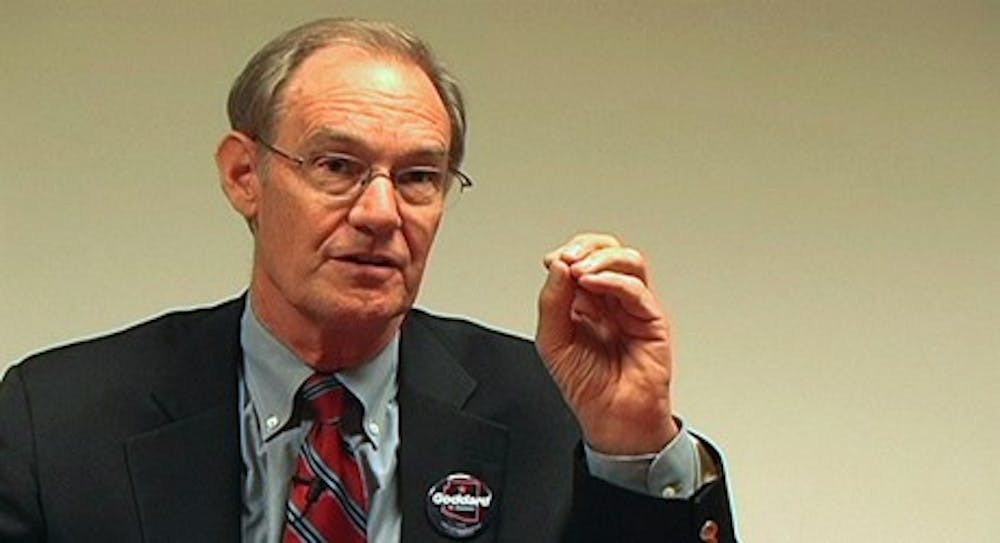With Election Day quickly approaching, candidates everywhere are making last-minute campaign stops to ask for voters’ support, including Democratic Arizona gubernatorial candidate Terry Goddard.
Goddard, an ASU law school graduate, served as the mayor of Phoenix for six years and now serves as the state’s attorney general.
He currently trails Republican Gov. Jan Brewer by about 14 points, according to the latest Rasmussen Reports survey of likely voters in Arizona. He is at 39 percent, while Brewer sits at 53 percent.
Goddard sat down with The State Press Saturday afternoon to talk about where he stands just days before the big day.
The State Press: What’s going through your head at this point with the election so close?
Terry Goddard: Well you truly get down to crunch time, and my theory is that we’ve just got to touch as many bases, as many parts of the state as possible. I’m trying to get to all 15 counties so that no part of Arizona is untouched [and] unstimulated, hopefully, in terms of turning out the vote and making sure people know what the stakes are in this election.
SP: How has the campaign trip been for the past several months?
TG: Well, it’s mostly just really hard work. I mean, I have a day job; I am attorney general. I have to make sure those ducks are in a row and that we’re doing the right thing ... But the campaign is about communication. It’s about making sure that folks all over the state of Arizona are hopefully paying attention, but most important, realizing what the stakes are.
SP: Looking ahead, if you are elected, what will be your first priority after taking office?
TG: Well, the next governor of Arizona has to get to work on jobs. We lost 360,000 jobs. Anybody in college today, anybody about to graduate, is going into one of the worst markets we’ve ever had. And for their sake and for our state’s future, it’s time to get serious.
SP: It has been said often that to fix today’s economy, we need to put more focus on higher education. How do you plan to stress the importance of higher education if you’re elected?
TG: As governor, [Jan Brewer] has basically taken aim at public education in general, both K-12 and the university system and plans to do more cuts. Her plan is not too solid; it is basically to take about $4 million out of K-12 and over $100 million out of the universities. That would drive up tuition at least $1,000 a semester if that were to happen. I am absolutely, diametrically opposed to further cuts, further attacks on education. I believe our future depends on not just excellence in K-12, but making sure we support our research universities, making sure that our graduates are the very best equipped we could have to enter a world economy and be ready to perform, be ready to excel ... It is our most important lifeline to economic success.
SP: How important is the younger generation’s vote for your campaign?
TG: It’s real important ... Right now it’s a dead heat between Jan Brewer and myself, and if I’m going to be successful, it’s going to take a record turnout in the universities to push it over. If you could say that any group was critical, I would say that the university students, graduate students today can make the difference in this election in Arizona. I believe, not just because I’m a candidate, but because I’ve watched Arizona and Arizona politics for a long time, this is the most important election of our lifetime.
SP: What will Election Day look like for you?
TG: Election Day, again, it’s a question of basically being in as many places as you could possibly be as one person. So I’ll be in Pima County. I will be there helping with some of the voter turnout activities. I’ll be at the University of Arizona to do a rally on campus. I’ll [actually] vote in Phoenix first, then I’ll go to Tucson, then I’ll be back in Phoenix for election returns ... I don’t want to leave any stone unturned. I don’t want to wake up on the third and thinking, “If I had just done one more thing, or gone to one more discussion point, it might make a difference.” I think it’s going to be that close and therefore every vote counts.
Brewer was not available for comment. The State Press did a Q&A with Brewer at the end of summer, which can be found at: http://bit.ly/statepressbrewer.
Reach the reporter at cottens@asu.edu




